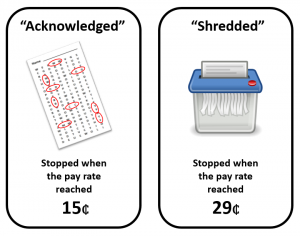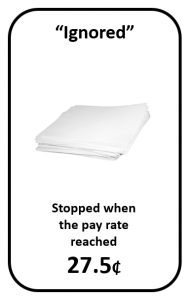 Most people understand that providing positive reinforcement is a proven way to encourage a desired behavior. But perhaps we don’t fully appreciate how powerful the simple act of acknowledging someone’s effort impacts their willingness to work – and therefore their productivity. A fascinating study sheds light on the connection between acknowledgment and intrinsic motivation.
Most people understand that providing positive reinforcement is a proven way to encourage a desired behavior. But perhaps we don’t fully appreciate how powerful the simple act of acknowledging someone’s effort impacts their willingness to work – and therefore their productivity. A fascinating study sheds light on the connection between acknowledgment and intrinsic motivation.
Researchers conducted an experiment to determine if simply acknowledging a person’s effort could increase their motivation to perform more work1. The results may cause you to reconsider how you interact with others for whom you provide leadership or direction.
The experiment was set up as follows:
A stack of papers was created where letters of the alphabet were placed in random order on each sheet of paper. Participants were given a single sheet and instructed to find all the pairs of identical letters that were next to each other.
When the first paper was completed, they were paid 55 cents. The participant was then asked if they wanted to complete the same assignment (finding adjacent pairs of letters) on another sheet of paper for 5 cents less. This process continued until the participant declined to do any more work. There were three conditions set up in this experiment. Each is described below.
In the “acknowledged” condition, each participant was asked to write their name on the top of the paper before beginning the assignment. (Note that writing their name on the sheet was a way to give the participant explicit ownership of their work). They circled all the pairs of letters they could find. Then they walked over to the experimenter and gave him the paper. The experimenter acknowledged their work by carefully examining the completed paper. He said, “Uh-huh,” and placed the sheet of paper face down on a pile on his desk. He then gave the participant two choices. (1) Work on another paper for 5 cents less, or (2) Stop and get paid for their work. If the participant requested another paper, the process continued.
In the “ignored” condition, the participants did not write their names anywhere on the paper. Also, when they handed in their completed sheet, the experimenter didn’t even look at their paper. He simply placed it face down on his desk without any kind of acknowledgment. As in the first condition, he asked the participant if he or she wanted to work on another sheet for 5 cents less – or stop and get paid.
The experimenters referred to the last (and most extreme) set-up as the “shredded” condition. In this case, when a participant handed in a completed sheet of paper, he or she was not acknowledged. Not only was the participant not acknowledged, but the experimenter immediately inserted the sheet into a shredder next to his desk, where it was destroyed! As in the other two conditions, he turned to the participant and asked if he wanted to complete another sheet for 5 cents less.
What would you predict the behavior of the participants to be after several cycles of the same condition? For instance, in the “ignored” condition, doesn’t it seem likely that people would be tempted to cheat? After all, no one was checking their work. Why should they bother to find all the pairs of letters on the sheet? In other words, why not earn more money for less work?
What about the participants in the “shredded” condition? Wouldn’t they be even more tempted to cheat? Once they realized that their work would be immediately destroyed, who would ever know if the assignment was completed at all? Why not hand in a blank sheet and get paid for doing nothing?
With this reasoning, you might expect that participants in the “ignored” and “shredded” conditions would choose to work longer for less money.
The results were somewhat surprising.
 In the “acknowledged” condition, participants stopped when the pay rate fell to around 15 cents. By stopping at this point, the participants indicated that doing more work was not worth their time.
In the “acknowledged” condition, participants stopped when the pay rate fell to around 15 cents. By stopping at this point, the participants indicated that doing more work was not worth their time.
Participants in the “shredded” condition stopped working much earlier – at about 29 cents. These results show that when we are acknowledged for our work, we are willing to work harder for less pay. Conversely, when we are NOT acknowledged, we lose our motivation earlier.
What about the “ignored” condition? Where do you think these participants stopped worki ng?
ng?
Participants in this condition stopped working when the payment per page was about 27.5 cents – only 1.5 cents less than the participants whose work was shredded!
The authors of the study summarized the finding this way:
“If you really want to demotivate people, “shredding” their work is the way to go, but you can get almost all the way there simply by ignoring their efforts.”
Think of a time when your work was “shredded”. Perhaps you had put in a lot of effort to complete a job. Then a decision-maker told you that your work product was no longer necessary. “Never mind,” he said. “We are going in a different direction. I need you to start working on this instead…” How did this make you feel? Most likely you were deflated, discouraged, or disappointed. And definitely demotivated.
Importantly, this experiment suggests that if your efforts are simply ignored, it is nearly as demotivating as having your work shredded. We have all been in this situation. We diligently complete an assignment or do a job (these can be routine jobs that are done every day or every week). Yet no one acknowledges our efforts in even a small way. Over time, we do the minimum work that is required.
On the other hand, consider how acknowledging someone’s efforts creates a different outcome. Acknowledgment is a gift from one person to another. It costs nothing, yet it can pay huge dividends. When a person is acknowledged, it conveys a message that they are doing meaningful work. These results show that we can increase motivation simply by acknowledging the efforts of those working with us.
What do we mean by acknowledging someone’s effort? Often it is accomplished through simple, sincere statements…
- I appreciate…
- Thanks for your efforts to…
- This is good work…
- I know it took some time…
So…Are you leveraging the power of acknowledging – or paying the price for ignoring?
References
1Payoff – The Hidden Logic That Shapes Our Motivations. Dan Ariely. Simon & Schuster. New York. 2016.
Photo attribution: iStockPhoto 464649829. standard license.


This rings true to me personally as a supervisor, and as an employee. A thank you, or a few words of encouragement, go a long way toward increasing motivation… but it must be sincere, and people can tell the difference.